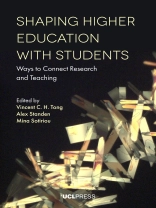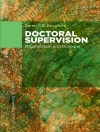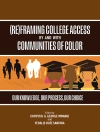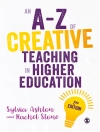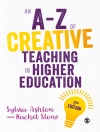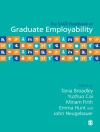Forging closer links between university research and teaching has become an important way to enhance the quality of higher education across the world. As student engagement takes centre stage in academic life, how can academics and university leaders engage with their students to connect research and teaching more effectively? In this highly accessible book, the contributors show how students and academics can work in partnership to shape research-based education.
Featuring student perspectives, it offers academics and university leaders practical suggestions and inspiring ideas on higher education pedagogy, including principles of working with students as partners in higher education, connecting students with real-world outputs, transcending disciplinary boundaries in student research activities, connecting students with the workplace, and innovative assessment and teaching practices. Written and edited in full collaboration with students and leading educator-researchers from a wide spectrum of academic disciplines, this book poses fundamental questions about learning and learning communities in contemporary higher education.
Praise for Shaping Higher Education with Students
‘The book offers a useful set of tools that inspire new ways of connecting with students through research projects, and will appeal to a range of practitioners –experienced or otherwise.’Innovations in Practice
‘Shaping Higher Education with Students is a great start to addressing the issues raised here through its rich examples of SSP practice from a diverse range of contexts. This book will prove to be particularly helpful and insightful for academics striving to connect research with teaching, staff setting up or facilitating extended SSP projects, and students commencing research projects and other partnerships with staff.’
International Journal for Students as Partners
表中的内容
Introduction
1 Shaping higher education pedagogy with students in a consortium setting
Vincent C. H. Tong
Section 1 The Context
Section Introduction
1.0. Student–staff partnerships: Setting the contexts for shaping higher education with students
Alex Standen
1.1. Connecting learning, teaching and research through student–staff partnerships: Toward universities as egalitarian learning communities
Kelly E. Matthews, Alison Cook-Sather and Mick Healey
1.2. The relationship between research-based education and student–staff partnerships
Jenny Marie
1.3. Where teaching meets research: Engaging postgraduate teaching assistants with research-based education
Alex Standen
1.4. Investigating student perceptions of student–staff partnership
Mina Sotiriou
1.5. Connecting students with staff research activities and real-world outputs
Ran Sing Saw
1.6. Transcending disciplinary boundaries in student research activities
Neema Kotonya
1.7. Connecting students with the workplace
Masuma Pervin Mishu
1.8. Involving tutors, demonstrators and teaching assistants more actively in large-group teaching
Mariya Badeva
1.9. Peer-assisted learning and assessment design
Tika Malla
Section 2 Connecting Research and Teaching Through Learning
Section Introduction
2.0. Research-based education: Engaging staff and students in praxis
Lauren Clark
2.1. The unifying role of learning across higher education
Ahmet Alptekin Topcu (with Professor Peter Abrahams)
Links to the R=T Framework
Charlotte Collins
2.2. Learning through mistakes: An important part of the learning and research process
Sabrina Jean Peters (with Professor Elizabeth Shephard)
Links to the R=T Framework
Francesca Peruzzo
2.3. Research = Teaching = Dialogue?: Dialogue as a model for research-based learning at university
Ellen Pilsworth (with Professor Robert Eaglestone)
Links to the R=T Framework
Tejas Joshi
2.4. Interdisciplinary research-based teaching: Advocacy for a change in the higher education paradigm
Agathe Ribéreau-Gayon (with Professor David d’Avray)
Links to the R=T Framework
James Claxton
2.5. Institutes for all: Learning from the Institute of Making
Frances Brill (with Professor Mark Miodownik)
Links to the R=T Framework
Lauren Clark
2.6. Creating space for active learning: (Opportunities from) using technology in research-based education
Eirini Gallou (with Professor Peter Abrahams)
Links to the R=T Framework
Christine Plastow
2.7. Learning-oriented assessment
Sayara Saliyeva (with Professor Jeremy Levesley)
Links to the R=T Framework
K. M. Nabiul Alam
2.8. Large-group teaching: Problematics, pedagogics and partnerships
Preeti Vivek Mishra (with Professor James Davenport)
Links to the R=T Framework
Harry Begg
2.9. Engaging students in research with ‘real-world’ outputs: Making an impact outside of the lecture theatre
Dallas Roulston (with Professor Rachel Mc Crindle)
Links to the R=T Framework
Joe Thorogood
2.10. Connecting graduates with the real world: Transferring research-based skills to the workplace
Jawiria Naseem (with Professor Lora Fleming)
Links to the R=T Framework
Danny Garside
2.11. Can research-based education be a tool to help students prepare for the world of work?
Joseph Telfer (with Professor Martin Oliver)
Links to the R=T Framework
Tobias Buschel
Section 3 Research-Based Education Through Student–Staff Partnership in Action
Section Introduction 3.0.
R=T in action: Making connections to support transitions and develop identities
Alex Standen and Mina Sotiriou
3.1. Why We Post – a team approach to research dissemination
Daniel Miller, Elisabetta Costa, Laura Haapio-Kirk, Nell Haynes, Tom Mc Donald, Razvan Nicolescu, Jolynna Sinanan, Juliano Spyer, Shriram Venkatraman and Xinyuan Wang
3.2. Challenges of interdisciplinary courses containing researchbased learning components
Carl Gombrich, Virginia Alonso Navarro, Isabelle Blackmore, Jacopo Blumberg, Emily Cox, Graham Hodges-Smikle, Jiaqi Lin and Charles Orr
3.3. Learning about what research is and how researchers do it: Supporting the pursuit of and transition to postgraduate studies
Cosette Crisan and Eirini Geraniou, Adam Townsend, Sebastian Seriani and Pedro I. O. Filho 3.4. Final-year projects as a vehicle for delivering research-based education
Ljiljana Marjanovic-Halburd and Yekatherina Bobrova
3.5. Digital tools for bridging the knowledge gap to university mathematics
Eirini Geraniou, Manolis Mavrikis and Maria Margeti
3.6. Examining linguistic diversity as a resource for higher education in the anglophone world
Siân Preece, Arnaldo Griffin, Yu Hao and Gozzal Utemuratova
3.7. Phys Film Makers: Connecting Physics students and researchers through the production of You Tube videos
Laura K. Mc Kemmish, Rebecca L. Coates, Frazina S. Botelho, Alvina Kuhai, Katherine V. C. Marshall and Laurence Z. J. Turlej
3.8. Meet the researcher: The use of interviews to connect firstyear undergraduate students to research staff at UCL
Julie Evans, Alex Standen, Alastair Mc Clelland and Siir Saydam
Epilogue
Inspiring Change: Advancing student–staff partnership and research-based education together
Vincent C. H. Tong, Lauren Clark, Alex Standen and Mina Sotiriou
关于作者
Mina Sotiriou is a Senior Teaching Fellow in the UCL Arena Centre for Research-based Education, and her focus is on Quality Assurance. Her work is primarily on curriculum design for online courses and student learning experience. Mina has worked in a number of higher education institutes in the area of learning technology, and she has designed many online courses. Her research interest is on the impact of professional development of short courses to learners
